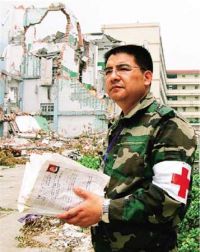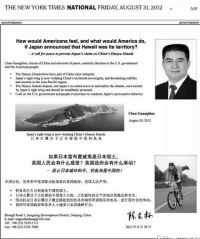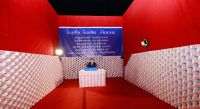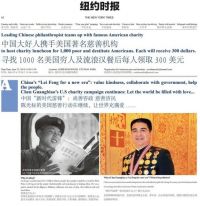Chen Guangbiao
Chen Guangbiao (陈光标), a Chinese billionaire and philanthropist, is famous for his high-profile but questionably motivated charity drive.
Chen became known as a big giver after the devastating Sichuan Earthquake [1] in 2008. He rushed to the scene with a fleet of 60 cranes and trucks in 36 hours, rescuing survivors and handing out cash to the homeless villagers. He spent 54 days in the quake-hit zone and donated more than 100 million yuan (US$15 million) for post-quake construction. His chivalric behavior, made known via TV programs, was applauded nationwide and won him the title of “China’s top philanthropist.” He is also nicknamed “Brother Biao”.
Yet people soon suspected that the widely-acclaimed philanthropist’s generosity was a publicity stunt. A highly circulated photograph of him posing behind his donation of a wall of thousands of 100-yuan banknotes in Nanjing drew heavy criticism. He thrust cash to the palm of the needy and took photos with them, but required the beneficiaries to raise the RMB he had given out. His charity was described as philanthropic violence. However, Chen seemed unfazed by the social pressure. He insisted on his “violent charity” and said his high-profile show was to attract other wealthy to emulate.
In January, 2011, he went to Taiwan and donated 110 million yuan (US$ 17 million) to local underprivileged families. He was joined by more than 50 other businessmen from the mainland. In March of the same year, he visited Japan after the devastating quake and tsunami. He donated money, food and daily necessities, and even rescued three people from the debris.
In an open letter to Warren Buffet and Bill Gates, he pledged to donate all his fortune to charity after his death. The duo made a trip to Beijing to talk about their Giving Pledge campaign, during which they asked the U.S.’s richest to pledge half their wealth to charity either during or after their lifetime, and help China start its own philanthropy community. Chen wrote to Buffet and Gates that it would be a shame to hoard his wealth, and he was pleased to accept the invitation.
Born in July 1968 into a family long inured in poverty, Chen witnessed the death of his brother and sister in his childhood. After the tragedy, the Jiangsu native decided to change his destiny. Chen garnered his gold nugget with his keen business sense after several setbacks and started prominent charity drives after his success. Chen is now the chairman of Jiangsu Huangpu Renewable Resources Utilization Co., Ltd., and is estimated to be worth $510 million, according to Hurun Report’s 2010 speculation.
On August 31, 2012, Chen took out a half-page advertisement in the New York Times saying, in both Chinese and English, that the Diaoyu Islands belong to China.
The ad, which Chen designed and wrote, said: "How would Americans feel and what would America do, if Japan announced that Hawaii was its territory?"
The ad featured his portrait and signature along with another photo of him on a bicycle. In the ad, he described himself as a "citizen of China and advocate of peace." Chen said the ad had initially said Pearl Harbor but the newspaper insisted he replace it with Hawaii.
After anti-Japanese protests in cities across China last year, Chen spent nearly US$800,000 on dozens of Chinese-made cars to give to people whose Japanese-branded vehicles were damaged.
Chen is also planning to buy advertising space in Japanese newspapers to assert China's sovereignty over the islands.
On Dec. 24, 2013, Chen decorated a temporary television studio in Nanjing with 16 metric tons of 100-yuan notes to promote the upcoming national economic census. The cash was transported to the studio in the provincial capital of Jiangsu province in a large truck and it took 20 people five hours to decorate the tent-turned-TV-studio with the cash.
On Dec. 30, 2013, Chen claimed he is in talks to buy the New York Times and will go to the U.S. soon to discuss the acquisition. However, the publisher of the New York Times has previously denied it is up for sale.
On June 16, 2014, Chen again took out a full-page ad in the New York Times to announce he's teamed up with American charities to offer a free lunch at a hotel to the poor and homeless.
Chen said he's looking for 1,000 poor and homeless people to enjoy the lunch between 11:30 am–1:30 pm on June 25 in Central Park. Those attending can also claim $300.



